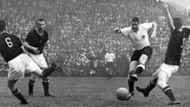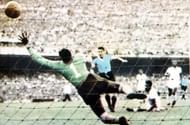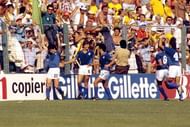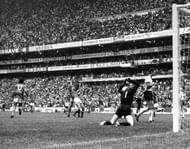We are only a few hours away from the commencement of the FIFA World Cup 2018 in Russia. The whole of Russia is eagerly and patiently waiting for the tournament to begin with the first match of the tournament being between hosts Russia and underdogs Saudi Arabia.
32 teams will be competing to see who is the greatest of them all.
So far, 836 matches have been played in the history of the FIFA World Cup and 2379 goals have been scored.
Out of these 836 matches, there have been a number of matches which have aged very well and have gone on to be regarded among the finest World Cup matches.
Let's take a look at the top five World Cup matches of all-time.
#5 2002 World Cup final between Brazil vs Germany
Ahead of the 2002 World Cup, not much was expected from Germany and Brazil. However, both teams played some dazzling football throughout the tournament and were in the final.
While Ronaldo was piling up goals throughout the tournament, Oliver Kahn was producing one save after another.
Germany had Miroslav Klose who was one lethal young striker but were without star attacking midfielder Michael Ballack who was suspended in the semi-final against South Korea after scoring what would go on to be the winning goal.
Brazil had the likes of Rivaldo, Ronaldinho, Cafu and Roberto Carlos in addition to Ronaldo. The match was expected to be a thrilling one and the battle everyone was eager for was "Ronaldo vs Kahn". Oliver Kahn conceded only one goal coming into the final.
The match was held at Yokohama and a crowd of close to 70000 had come to see the final.
Brazil got a good scoring chance in the 19th minute when Ronaldo was played by Ronaldinho only for the former to hit his shot wide of the target.
In the half-hour mark, Ronaldo had another good chance but this time he was pressured by centre-back Thomas Linke and could not get much power on his shot which was eventually saved by Kahn.
During the final minutes of the first half, Kleberson hit the bar. During injury-time, a Roberto Carlos pass found Ronaldo but Oliver Kahn saved it by outstretching his foot.
The beginning of the second half saw Germany getting some scoring chances for a change. Jens Jeremies tried to score from a corner in the 46th minute but his header was blocked by Edmilson.
In the 50th minute, Oliver Neuville struck a brilliant free-kick but Brazil goalkeeper Marcos got his hands on the ball and it hit the post instead.
In the 67th minute, Ronaldo won possession of the ball from Dietmar Hamann and passed towards Rivaldo. Rivaldo took a shot which was only blocked by Oliver Kahn. Ronaldo then scored from the rebound to give Brazil the lead.
Brazil kept on attacking but the Germans were resilient. However, resilience wasn't enough for Germany. They even brought on Oliver Bierhoff who scored the golden goal of Euro 1996 but they weren't able to get the equaliser.
With 11 minutes to go, a run from Kleberson baffled the German defenders. Kleberson's pass went towards Rivaldo who allowed the ball to pass through his legs towards the unmarked Ronaldo.
Gerald Asamoah came in to pressure Ronaldo but the latter used his first touch to get the ball away from Asamoah before finding the bottom corner of the net to double Brazil's lead.
Germany tried to keep their hopes alive and nearly scored one in the 83rd minute but Marcos saved Oliver Bierhoff's powerful shot from close range.
The match ended with Brazil winning their 5th World Cup while Germany lost their 4th World Cup final.
#4 1954 World Cup Final

Hungary and West Germany were up against one another in the 1954 World Cup Final at Bern. Hungary were heavy favourites to win the World Cup right from the beginning of the tournament as they had what is still remembered as one of the strongest teams of all time.
With the likes of Ferenc Puska, Sandor Kocsis, Zoltan Czibor, Nandor Hidgekuti, Jozsef Bozsik and Gyula Grosics, Hungary played sime dazzling football throughout the tournament, scoring a minimum of four goals in their matches before the final.
They defeated the top two teams of the 1950 World Cup Uruguay and Brazil in the semis and quarters respectively by a margin of 4-2.
West Germany who became a FIFA member just four years back, were thrashed by Hungary 8-3 during the group stages but they came back strongly with a 7-2 thumping of Turkey. They defeated heavily favoured Yugoslavia 2-0 in the quarterfinals before shocking Austria 6-1 in the semi-finals.
A crowd of roundabout 62500 people gathered in the Wankdorf Stadium at Bern to witness the title clash. It was heavily raining that day which was an advantage for West Germany as their skipper Frotz Walter was well known for playing his best football on wet pitches.
Hungary began to assert their authority over the Germans from the beginning and it took only six minutes for them to take the lead thanks to the great Puskas who scored from close range after Sandor Kocsis' shot rebounded.
Just two minutes later, Bozsik took a shot at goal which was blocked by West German left-back Werner Kohlmeyer.
However, Kohlmeyer made a back pass which wrong-footed goalie Toni Turek and Zoltan Czibor took advantage of this by putting the ball in the back of an empty net to double Hungary's lead.
Just two minutes after Hungary's second goal, West German skipper Fritz Walter played a ball to Helmut Rahn on the left. Rahn crossed low and the ball went between the legs of Jeno Buzanszky and left half Jozsef Zakarias deflected the ball towards Max Morlock who scored the first goal for West Germany.
In the 18th minute, West Germany got a corner which skipper Walter played short and was cleared for another corner. The second corner was long and high and reached Helmut Rahn who headed the ball in to equalise for West Germany.
Following the leveling of scores, Hungary took control of the game and had some really good chances. In the 23rd minute, Sandod Kocsis headed a Mihaly Lantos cross towards Nandod Hidgekuti whose volley was brilliantly saved by Turek.
Minutes later, Hidgekuti took a powerful shot from just outside the penalty area but unfortunately, it hit the post.
West Germany had a brilliant chance to take the lead during the final few minutes of the first half as Hans Schafer's saw Gyula Grosics make a save but the ball went towards Rahn who shot the ball only for Buzanszky to clear the ball on the goal line.
Hungary created plenty of chances during the second half. Just nine minutes into the half, Kohlmeyer was forced to make two goal-line clearances from Mihaly Toth.
Hungary was forcing one attack after another but West Germany were equally resilient. The Germans got a good scoring opportunity in the 72nd minute when Fritz Walter played a ball to Helmut Rahn from a corner kick and Rahn's powerful shot from the edge of the penalty box was saved by Grosics.
In the 84th minute, Hans Schafer dispossessed Bozsik and crossed high towards the penalty box. The ball was cleared short but was picked up by Helmut Rahn.
Rahn feigned a pass to Ottmar Walter to wrong-foot the Hungarian defenders and hit the ball low past Grosics to give West Germany the lead. This was the first time Hungary were trailing in the tournament.
Hungary did not give up and created a few good chances during the twilight of the game. In the 86th minute, Puskas scored a goal which was ruled offside. In the dying moments of the match, Czibor shot from close range but his shot was saved by Turek.
The final whistle was blown and the crowd could not believe their eyes. West Germany stunned Hungary to win their first World Cup. This ended Hungary's 32-match unbeaten streak which lasted for over four years. It was the "Miracle of Bern" indeed.
Hungary's persistent attacking prowess, West Germany's resilience are just a few of the many reasons why this match will be regarded as one of the greatest World Cup matches ever.
#3 Brazil vs Uruguay, 1950 World Cup

The 1950 World Cup is the only World Cup in history which never had a final. The tournament was to be decided by a final group stage between the four group winners.
The round-robin went in such a way that the final match of the tournament would determine the champion.
Hosts Brazil were up against Uruguay in the match that was to be held at the Maracana. Brazil were heavy favourites to win the match as they had thrashed Sweden and Spain 7-1 and 6-1 respectively.
Uruguay on the other hand came from 2-1 down to draw 2-2 against Spain and did the same thing against Sweden to win 3-2 thanks to Oscar Miguez's last-gasp winner.
Even a draw would be enough for Brazil to win the title but Uruguay needed a win to lift the trophy.
Celebrations had already begun in Brazil before the final. Even the mayor of Rio was confident of Brazil winning the final.
He delivered a speech stating, "You, players, who in less than a few hours will be hailed as champions by millions of compatriots! You, who have no rivals in the entire hemisphere! You, who will overcome any other competitor! You, who I already salute as victors!"
Even a victory song named "Brasil Os Vencedores" (Brazil the Victors) was composed which was practiced and was supposed to be played after the final. 22 gold medals were already made with the name of each player of the Brazil squad inscribed on them.
On the day of the final, the streets of Rio were full of celebrations. A newspaper called O Mundo published a photograph of the Brazilian team with the caption "These are the World Champions."
Uruguayan skipper Obdulio Varela bought several copies of the paper and told his teammates to urinate on them.
Uruguay coach Juan Lopez advised his players to play defensively if they were to overcome Brazil's herculean offense. However, their skipper Varela told his teammates not to play defensively or else the scoreline wouldn't be any different from Brazil than their previous two matches.
Varela inspired his players through a speech, using the line, "Muchachos, los de afuera son de palo. Que comience la función" ("Boys, outsiders don't play. Let's start the show").
A crowd of nearly 200,000 had gathered at the Maracana to see the final.
The match with Brazil going on the offensive from the start. Uruguay, however, were able to contain the likes of Ademir and Zizinho unlike Spain and Sweden and the first half ended 0-0 to the surprise of many.
Just two minutes into the second half, striker Friaca shot past Uruguayan keeper Maspoli to give the Brazilians the lead. The Brazilian fans erupted.
Uruguay skipper Varela argued with the referee regarding the validity of the goal, claiming that Friaca was offside. However, the goal stayed.
Shortly after Brazil's goal, Uruguay began to take control of the game and they were taking several chances at goal. The Brazilian defense was clearly lacking the tenacity and striker Juan Alberto Schiaffino took advantage of this to score Uruguay's equaliser.
Uruguay found hope but Brazil were still at an advantage as the draw would still lead them to the trophy. Both teams were attacking hard and in the 79th minute, the stalemate was broken.
Striker Alcides Ghiggia came running from the right and shot the ball low past Brazilian goalie Barbosa to give Uruguay the lead. The Brazil fans were silenced and remained that way till the final whistle was blown and Uruguay were crowned the champions of the World Cup.
The final whistle was followed by a strange silence by the Brazilian supporters. Several Brazilian newspapers refused to buy the fact that Brazil were defeated. Four of the team's players including captain Augusto never played for Brazil again. Some fans even went on to commit suicide.
Uruguay on the other hand, had scripted one of the biggest upsets in football history and broke the hearts of an entire nation.
#2 Italy vs Brazil, 1982 World Cup

Brazil were heavy favorites to win the 1982 World Cup with a team that included world-class players like Socrates, Zico and Falcao to name a few.
Brazil were terrific throughout the tournament, having won all their group games and defeating Argentina 3-1 in their first match of the second group stage.
Italy had a very slow start to the tournament as they did not win any of their group games but managed to beat Argentina 2-1 in the second group stage.
Italy and Brazil were up against one another to determine who would qualify for the semi-finals. The match was held at the Sarria Stadium in Barcelona and an estimated crowd of 44000 came to witness the encounter.
For Brazil, a draw was sufficient for them to go through to the semis due to a superior goal-difference over the Italians.
The Italian defense was put to task from the beginning as the Brazilian shot several volleys towards the goal. The tenacious Claudio Gentile who marked Maradona, was given the task of marking Zico.
However, it was Italy who took the lead thanks to Paolo Rossi who headed a cross from Antonio Cabrini into the net. The Brazilians were not ones to back down and it took them only seven minutes to equalise thanks to the physician on their side, Socrates.
Moments after Socrates' goal, Gentile made a tackle on Zico which earned him a yellow card and suspension from the semi-final if Italy were to make it.
Italy restored their lead in the 25th minute when Rossi intercepted a pass from Cerezo and shot it past Brazilian custodian Waldir Peres.
Brazil threw everything they had on Italy but the Italian backside consisting of Cabrini, Gentile, Scirea and young substitute Giuseppe Bergomi were extremely resilient. 40-year old goalie Dino Zoff was put to the test but he continued to foil the Brazilians.
Brazil found their equaliser in the 68th minute when Falcao collected a pass from Junior and found the net from 20 yards.
Six minutes later, Italy had a corner and Gaetano Scirea's corner saw Bergomi and two Brazil players vying for the ball. The ball was not cleared and went towards Marco Tardelli who shot the ball which was later hit into the net by Paolo Rossi to complete his hat-trick and give Italy the lead.
This was Italy's second hat-trick in the FIFA World Cup with their first coming nearly 5 decades ago by Angelo Schiavio against USA in 1934.
Antognioni scored a fourth for The Azzurri but it was ruled offside. During the final moments of the game, Eder took a free-kick which was headed by Oscar towards the goal but Zoff made a terrific save to deny Brazil the equaliser.
The match ended with Italy prevailing 3-2 and going to the semi-finals. Brazil's World Cup journey came to an end.
Brazil's 1982 team still remains to be amongst the greatest teams not to win a World Cup but they were beaten fair and square by an Italian team in a match which is one of the greatest matches in the history of the game.
#1 Italy vs West Germany, 1970 World Cup

Italy and West Germany locked horns in the semi-finals of the 1970 World Cup. West Germany won all their group games and came back from 2-0 to defeat England in the quarter-finals which was a rematch of the 1966 World Cup final.
Italy, on the other hand, scored just one goal in the group stages but thrashed hosts Mexico in the quarters.
The match was held at the Estadio Azteca and a crowd of more than 102000 people had gathered to witness the encounter.
It took just eight minutes for Italy to take the lead thanks to Roberto Boninsegna. West Germany tried hard to equalise but the Italian defense consisting of the likes of Tarcisio Burgnich and Giacinto Facchetti kept the Germans at bay.
Dino Zoff was also doing a terrific job between the sticks. Franz Beckenbauer had dislocated his shoulder during the match but continued to play with a sling since West Germany had used up all of its substitutions.
Italy also tried hard to double their lead but Sepp Maier kept on producing a number of fine saves.
Just when it looked like Italy were going to the final, Jurgen Grabowski crossed a ball towards goal and Karl-Heinz Schnellinger tapped the ball in to equalise for West Germany. Schnellinger was playing with AC Milan at the time and this was his only international goal.
The match went into extra time and in the 94th minute, West Germany were given a corner.
The corner went towards skipper Uwe Seeler whose header was chested by substitute Fabrizo Poletti but he could not control the ball. Gerd Muller took advantage of this and shot the ball into the goal to give West Germany the lead.
Italy got a free-kick in the 98th minute which was lofted towards the German goal. Midfielder Sigfried Held's touch deflected the ball towards Burgnich whose shot beat Maier and equalised for Italy.
In the 104th minute, Luigi Riva received a cross from the left and after baffling Schnellinger, shot from his left-foot and into the back of the net to give Italy the lead.
However, West Germany were not backing down and were playing offensively in search of an equaliser. In the 110th minute, Reinhard Libuda crossed from the right and his cross was headed by Seeler. Seeler's header found Gerd Muller who headed the ball past Dino Zoff to equalise for West Germany.
Just after the ensuing kick-off, Giacinto Facchetti played the ball towards Boninsegna who passed the ball to Gianni Rivera. Rivera shot the ball into the German net to restore the lead for Italy.
The Italians were resilient enough to contain the West German strikers for the remaining 9 minutes and won the game 4-3 to reach the final.
From the top quality of football played by both nations to a record of 5 goals being scored in extra time, there are plenty of reasons why this match is nicknamed "The Game of the Century" and will always be the greatest FIFA World Cup match ever.
Do you agree with our list, or did we miss out on any memorable match? Sound off in the comments section below!
